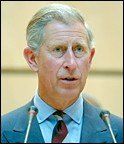It’s a new year and many chiropractors are evaluating what will enhance their respective practices, particularly as it relates to their bottom line. One of the most common questions I get is: “Do I need to be credentialed to bill insurance, and what are the best plans to join?” It’s a loaded question – but one every DC ponders. Whether you're already in-network or pondering whether to join, here's what you need to know.
A Royal Recommendation
In a May 23, 2006 speech at the 59th World Health Assembly in Geneva, Switzerland, Prince Charles emphasized the need for health care providers in industrialized and developing nations to adopt more integrated approaches to health care, citing a "dangerously fragmented and abstracted" world view that is leading mankind further from valuable ancient traditions in medicine.
While noting several alarming statistics and various clinical studies regarding the state of disease and chronic illness worldwide, Prince Charles' speech also was marked by an appeal for empathy, hope and compassion - the humanity too often absent from traditional patient care.

Excerpts from Prince Charles' speech appear below; the complete speech is available online.
- "In many ways, and over rather too long a period, we have maintained a dangerously fragmented and abstracted view of our world which has led to the abandon-ment of a great deal of valuable traditional knowledge and wisdom. As a result, we are beginning to reap the harvest we have sown through living off Nature's capital rather than her income. I believe, Ladies and Gentleman, that there is now a desperately urgent need to redress the fragile, but vital balance between man and Nature through a more integrated approach where the best of the ancient is blended with the best of the modern."
- "At the start of the 21st century, we are still challenged by frightening new pathogens threatening to cross the species divide, by the tragedy of natural disasters and the health implications of military conflicts and population migrations. In preventing and controlling such suffering, we must think beyond the practice of reducing everything to component parts, and this is where, I believe, modern medicine needs to accommodate a more integrated and holistic approach."
- "I feel we need to be prepared to think radically - and certainly beyond the range of conventional health approaches. I have long felt that we have somehow lost touch with our instinct and intuition for each other, and for our environment. The time has surely come to appreciate that the complexity of chronic diseases requires considered and multi-dimensional solutions."
- "We need also to think radically about our objectives in improving the lifestyles of those who suffer from chronic conditions. The need to prevent deterioration, to maximize the quality of life and the ability of a patient to function, calls for a more holistic approach - one which respects an individual's choices, culture and expectations.
"This is where orthodox practice can learn from complementary medicine, the West can learn from the East and new from old traditions Many of today's complementary therapies are rooted in ancient traditions that intuitively understood the need to maintain balance and harmony with our minds, bodies and the natural world. Much of this knowledge, often based on oral traditions, is sadly being lost, yet orthodox medicine has so much to learn from it." - "Hippocrates said, 'First, do no harm.' I believe that the proper mix of proven complementary, traditional and modern remedies, which emphasizes the active participation of the patient, can help to create a powerful healing force for our world."
- "In every treatment, the human attributes of compassion, empathy, touch and rapport are as vital to the art of medicine and healing as they are to the essence of humanity. An integrated approach gives each individual the means and hope of contributing to his or her own healing. Integrated practitioners provide time, empathy, hope and reassurance - the so-called 'human effect' - which can produce major changes in the immune system."
- "In the United Kingdom, research in recent years has shown that fifty percent of General Practitioners are referring their patients to complementary practitioners, and, according to B.B.C. Television surveys, over seventy-five percent of patients would like to have the choice of a complementary as well as an orthodox approach to their problem."
- "Could I suggest that each country represented here today look at the responsibility, over the next five years say, of developing its own integrated plan for future health and care, perhaps beginning with a pilot or feasibility study? If I may say so, such a plan would reflect your disparate cultures and medical traditions and would recognize the importance of all aspects of the natural environment. It would be a plan that would integrate medical services with individual and community approaches to health and self-care; a plan the might build upon current examples of integrated health and care, which exist everywhere."
- "Centuries ago, Plato said, 'The cure of the part should not be attempted without treatment of the whole.' Centuries later, the World Health Organization recognized this principle in its 1948 constitution, when it defined health as a 'complete state of physical, mental and social wellbeing.' Today, therefore, is our chance to redefine our health systems so that they provide the balance and connectedness that the 21st century so desperately needs."
Supporting Prince Charles' recommendations is The Prince's Foundation for Integrated Health (FIH), an independent charity he founded and presides over. The FIH works to widen access to complementary health care, promote confidence in integrated approaches, and promote greater understanding of integrated health. Working to advance the integrated health care agenda, the FIH has opened for public comment a document titled Exploring a Federal Approach to Voluntary Self Regulation of Complementary Healthcare. The document outlines the issues that would need to be considered in developing a federal body and provides a potential framework for any future regulator.
The document followed the release of an FIH-commissioned report titled Development of Proposals for a Future Voluntary Regulatory Structure for Complementary Healthcare Professions, or "The Stone Report," which examined three options for regulation of complementary health care, making a case in favor of a federal structure. With the new document (Exploring), the FIH has accepted that a single federal structure should be seriously considered. The comment or "consultation" period opened May 1 and will remain open until July 28, 2006. To download a copy of Exploring a Federal Approach to Voluntary Self Regulation of Complementary Healthcare and submit a response form, please visit here.



